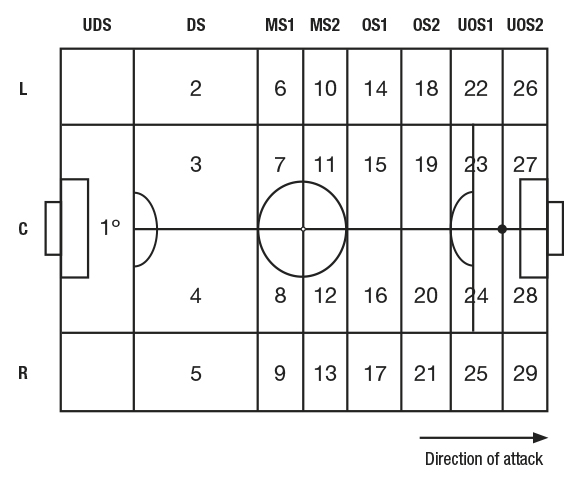Table 2
PePas observational instrument criteria and categories.
| CRITERIA | SUB-CRITERIA | CATEGORIES | CODE |
| 1. Ball recovery or ball development before the last pass (RDB) (adapted from Barreira et al., 2013) | BY COLLECTIVE ACTION | Short pass Long pass Throw-in Corner Kick | RDBsp RDBlp RDBti RDBck |
| BY INDIVIDUAL ACTION | Running with the ball Dribbling (1×1) Ball control Defensive behaviour followed by a pass Opponent’s intervention with no success | RDBrb RDBd RDBbc RDBdb RDBns | |
| 2. Penetrative pass (PP) (adapted from Melo, 2017) | Short penetrative pass preceded by a collective action Short penetrative pass preceded by an individual action Long penetrative pass preceded by a collective action Long penetrative pass preceded by an individual action Opponent’s intervention with no success Short penetrative pass preceded by an opponent’s intervention with no success Long penetrative pass preceded by an opponent’s intervention with no success | PPspca PPspia PPlpca PPlpia PPns PPspns PPlpns | |
| 3. Development of the ball possession after the last pass (DA) (adapted from Barreira et al., 2013) | Running with the ball Dribbling (1×1) Ball control Unsuccessful attempt Shot on goal with one contact | DArb DAd DAbc DAua DAoc | |
| 4. First Defender (DD) tactical-technical actions (adapted from Fernandes et al., 2019) | CLOSE MARKING | Player marking Pressure Intervention without success Unsuccessful tackle | DDmh DDcp DDis DDtr |
| DEFENSIVE SPACE MANAGEMENT | Close longitudinal spaces Close transversal spaces Zonal cover with player marking Control or balance positioning | DDel DDet DDcz DDpe | |
| DEFENSIVE RECOVERY | Displacements of recovering Recovery balance | DDdr DDer | |
| DEFENSIVE VIGILANCE | Defensive coverage Temporisation | DDcb DDct | |
| 5. Second Defender (DI) tactical-technical actions (adapted from Fernandes et al., 2019) | CLOSE MARKING | Player marking Pressure Intervention without success Unsuccessful tackle | DImh DIcp DIis DItr |
| DEFENSIVE SPACE MANAGEMENT | Close longitudinal spaces Close transversal spaces Zonal cover with player marking Control or balance positioning | DIel DIet DIcz DIpe | |
| DEFENSIVE RECOVERY | Displacements of recovering Recovery balance | DIdr DIer | |
| DEFENSIVE VIGILANCE | Defensive coverage Temporisation | DIcb DIct | |
| 6. End of the offensive phase (F) (adapted from Barreira et al., 2013) | Goal conceded Shot on target | Fgl Fst | |
| 7. Pitch zones and sectors where the actions took place (adapted from Castañer et al., 2016) |  | ||
| UDS = Ultra defensive sector; DS = Defensive sector; MS1 = Middle sector 1; MS2 = Middle sector 2; OS1 = Offensive sector 1; OS2 = Offensive sector 2; UOS1 = Ultra offensive sector 1; UOS2 = Ultra offensive sector 2; R = Right; C = Central; L = Left | |||
| 8. Centre of the game (CJ) (adapted from Barreira et al., 2013) | WITH PRESSURE (P) | Relative numerical inferiority Absolute numerical inferiority Pressure in numerical equality | Pr Pa Pe |
| WITH NO PRESSURE (NP) | No pressure in numerical equality Relative numerical Superiority Absolute numerical Superiority | NPe NPr NPa | |
| 9. Spatial pattern of interaction between teams (CEI) (adapted from Barreira et al., 2013) | VERSUS EXTERIOR ZONE | Back line versus exterior zone | BE |
| VERSUS OFFENSIVE LINE | Ball in the empty zone (goalkeeper) versus offensive line Back line versus offensive line Mid line versus offensive line | EF BF MF | |
| VERSUS MID LINE | Back line versus mid line Mid line versus mid line Offensive line versus mid line | BM MM FM | |
| VERSUS BACK LINE | Mid line versus back line Offensive line versus back line Exterior zone versus back line | MB FB EB | |
| VERSUS EMPTY ZONE | Offensive line versus empty zone (goalkeeper) | FE | |


